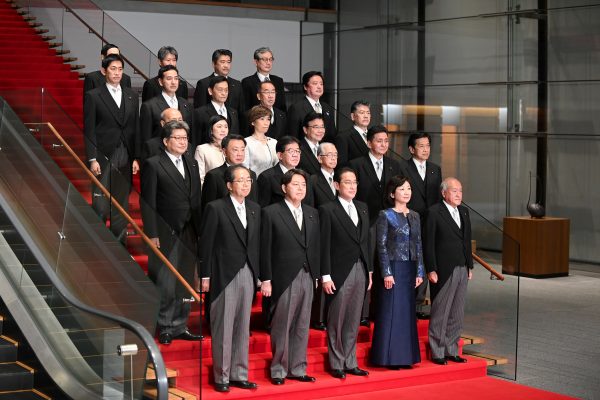Nobuchiyo is a classic example of the hereditary politics that remain entrenched in Japan’s political system. On 14 February 2023, Mainichi Shimbun reported that Nobuchiyo was forced to take down his family tree from his website homepage because of criticism of its hereditary symbolism. Hereditary politicians, called seshu, are those whose family members serve as politicians, train their inheritors and pass on their political capital accumulated over decades.
Coming from a renowned Liberal Democratic Party (LDP) political family in Japan’s rural Yamaguchi prefecture, Nobuchiyo Kishi is almost guaranteed to succeed in the by-election on 23 April. His great-grandfather Nobusuke Kishi and uncle Shinzo Abe have been two prominent prime ministers. Nobuchiyo is also closely related to a third prime minister, Eisaku Sato, and Shintaro Abe — Japan’s former foreign minister and father of Shinzo Abe.
In 2022, Prime Minister Fumio Kishida appointed his eldest son Shotaro as his executive secretary for political affairs, which has come under criticism. His appointment is again in the spotlight after a trip with his father to London where he allegedly misused his official car for shopping purposes.
It is clear that Kishida is preparing his eldest son to inherit his political assets and run for a parliamentary seat. In light of this obvious favouritism, the Japanese media has adopted the term, ‘nepobaby’, meaning ‘nepotism baby’.
Political inheritance is neither new nor unique to Japan. Hereditary politicians are not uncommon in industrialised democracies, including the United States — the Kennedy family being the leading example. The Prime Minister of Canada, Justin Trudeau, is also the eldest son of Pierre Trudeau, Canada’s former prime minister.
In many Asian countries — both democratic and non-democratic — political families have dominated politics and government. India’s Nehru–Gandhi family is a case in point. Singapore’s Lee Hsien Loong, who has served as Prime Minister for close to twenty years since 2004, is the eldest son of the late Lee Kuan Yew, prime minister from 1959–90. The current Philippine President Ferdinand Marcos Jr, comes from a political family, too. Park Chung-hee, the father of South Korea’s first female president Park Geun-hye, served as President from 1963–79. In non-democratic systems such as North Korea, the Kim family monopolises power.
But the extent of political nepotism in Japan — a modern and industrialised country — remains unmatched. Rather than showing signs of weakening, it has strengthened in recent decades. In 1960, only 3 per cent of Japanese parliamentarians were hereditary politicians. Despite political attempts at reducing that percentage, it has swelled to 30 per cent today.
Most of Japan’s postwar prime ministers, including Kishida, have come from a political family. Yoshihide Suga was an exception in recent years. Potential future prime ministers, such as Taro Kono and Shinjiro Koizumi, are also hereditary politicians.
In its 2009 election manifesto, the Democratic Party of Japan (DPJ) announced it would ban immediate family members from inheriting constituencies. Ironically, its first Prime Minister, Yukio Hatoyama, came from a political dynasty. But the other two DPJ prime ministers, Yohihiko Noda and Naoto Kan, did not come from political families.
Though the LDP has the highest percentage of hereditary politicians, the main opposition party — the Constitutional Democratic Party of Japan, successor to the DPJ — also has hereditary parliamentarians, albeit only 6 per cent. Neither the LDP’s junior coalition partner Komeito nor the Communist Party of Japan have any such representatives in the national parliament.
Hereditary politicians inherit the valuable resources: Jiban, or the network of local support groups and organisations; Kanban, or name recognition, such as the Kishi or Koizumi families; and Kaban, or financial support through the network and the faction to which a hereditary politician belongs. The electoral success of hereditary politicians is much higher than non-hereditary candidates. A Nikkei Asia longitudinal study notes that ‘candidates connected by blood or marriage have an 80 per cent chance of winning’, while only about 20 per cent of first-time candidates win.
This tradition of politics as a family business continues, with many legislators being third- and fourth-generation parliamentarians. Nobuchiyo will be a fourth-generation politician. There are many third-generation parliamentarians in key government and party posts, including Prime Minister Kishida himself.
Many key ministers in the Kishida Cabinet are also hereditary politicians. Foreign Minister Yoshimasa Hayashi is the son of former finance minister Yoshiro Hayashi. Defence Minister Yasukazu Hamada is the son of Koichi Hamada, a notorious LDP lawmaker who admitted to being a ‘yakuza’ — a member of Japan’s mafia-like criminal organisations. Finance Minister Shunichi Suzuki’s father, Zenko Suzuki, served as prime minister from 1980–82. Digital Transformation Minister Taro Kono’s father was foreign minister and his grandfather, Ichiro Kono, served as Japan’s deputy prime minister.
Some voters see hereditary politics in a negative light, but they also appreciate such politicians bringing more pork projects to their districts than non-hereditary politicians. Politics as a family business remains one of Japan’s most robust and thriving industries.
Purnendra Jain is Emeritus Professor in Asian studies at the University of Adelaide.
Daisuke Akimoto is Adjunct Lecturer at Tokyo’s Hosei University.


Seems to me that as long as many current politicians are descendants of past ones there will be little likelihood of Japan ever changing its domestic and foreign affairs policies. Abe was a powerful example of someone trying to live up to the nationalist and patriarchal values of his grandfather. Thus, he pursued problematic policies with S Korea and was unable/unwilling to really provide women with viable opportunities for advancement at home.
Koizumi’s son has failed to distinguish himself in any significant way. What will Kishida’s son do in the coming years?